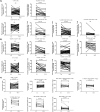Hydroxychloroquine reduces T cells activation recall antigen responses
- PMID: 37531383
- PMCID: PMC10395872
- DOI: 10.1371/journal.pone.0287738
Hydroxychloroquine reduces T cells activation recall antigen responses
Abstract
Background: In the context of the current COVID-19 pandemic, there is still limited information about how people suffering from autoimmune diseases respond to the different COVID vaccines. The fact that they are taking an immunosuppressant or other drugs that aim to decrease the immune system activities, such as hydroxychloroquine (HCQ), could also impact their ability to respond to a COVID vaccine and vaccines in general.
Methods: Heathy donors were given 200mg of HCQ daily for 6-weeks to assess HCQs impact on the systemic T cells and humoral immune response. Peripheral blood mononuclear cells (PBMC) and plasma were obtained at baseline and 6-weeks after starting daily HCQ. Flow cytometry assays were designed to determine changes in T cell activation and T cell responses. Bead array multiplex were used to analyse antibodies and cytokine levels before and after HCQ intake.
Results: As anticipated, HCQ treatment decreased ex vivo T cell activation. We observed a decrease in CD4+CD161- expressing CCR5 (p = 0.015) and CD69 (p = 0.004) as well as in CD8+CCR5+ (p = 0.003), CD8+CD161+CCR5+ (p = 0.002) and CD8+CD161+CD95+ (p = 0.004). Additionally, HCQ decreased the proportion of Th17 expressing CD29 (p = 0.019), a subset associated with persistent inflammation. The proportion of T regulatory cells expressing the inhibitory molecule TIGIT was also reduced by HCQ (p = 0.003). As well, T cells from people on HCQ were less responsive to activation and cytokine production following stimulation with recall antigens and memory T cells were less likely to produce both IFNγ and TNFα following stimulation.
Conclusion: This study shows HCQ is associated with lower T cell activation and decreased T cell cytokine production. While this study was not performed with the intent of looking at COVID vaccine response, it does provide important information about the changes in immune response that may occur in patient taking HCQ as a treatment for their autoimmune disease.
Copyright: © 2023 Kowatsch et al. This is an open access article distributed under the terms of the Creative Commons Attribution License, which permits unrestricted use, distribution, and reproduction in any medium, provided the original author and source are credited.
Conflict of interest statement
The authors have declared that no competing interests exist.
Figures




References
-
- Bertagnolio S, Thwin SS, Silva R, Nagarajan S, Jassat W, Fowler R, et al. Clinical features of, and risk factors for, severe or fatal COVID-19 among people living with HIV admitted to hospital: analysis of data from the WHO Global Clinical Platform of COVID-19. Lancet HIV [Internet]. 2022;9(7):e486–95. Available from: 10.1016/S2352-3018(22)00097-2 - DOI - PMC - PubMed
-
- Akiyama S, Hamdeh S, Micic D, Sakuraba A. Prevalence and clinical outcomes of COVID-19 in patients with autoimmune diseases: a systematic review and meta- analysis. BMJ Autoinflammatory Disord. 2020;1–8.
Publication types
MeSH terms
Substances
Grants and funding
LinkOut - more resources
Full Text Sources
Medical
Research Materials

